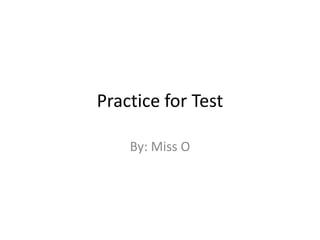
Practice for test
- 1. Practice for Test By: Miss O
- 2. Pronouns Know how to find them in a sentence • Words that take the place of people or things: I, you, he, she, it, we, they me, him, her, it, us, them
- 3. Pronouns • my, mine • your, yours • our, ours • their, theirs • his • her, hers
- 4. Pronouns • who • whom • which • whose • what
- 5. Pronouns • this • that • these • those
- 6. Pronouns all each more none several another either most no one some any few much one both many neither other
- 7. Types of Leads • Onomatopoeia- Boom! Crash! Poow! Sound Leads! Goes straight to the action • • Posing a question- What's it like to be a cat? • • Astonishing Fact- I will always remember when the stars fell around me lifting me up around the George Washington Bridge. Starts with a fact. • • Setting the mood- Set the mood and emotional feel about the book. Place and time. Most used leads. • • Exclamatory-One word with an exclamation point ! Go! Stop! Leave! • • Dialogue- Amazing piece of dialogue in the story. Find a piece from your story that you think is good. • • Climactic- Take one of the first obstacles and then you can flash back. Start at the climax of the story.
- 8. What is a lead? • What is a lead? • Leads are crafted, you have to learn. • The first sentence in a story • Makes it interesting • Hooks the reader • Introduce the book • Emotional tie • Vivid words, good description • They flash pictures in your mind with concrete details • The best lead puts you right in the middle of something happening. Action!
- 9. How to study • To study you should practice practice practice by reviewing this power point, memorizing pronouns, knowing definitions and knowing what a lead is. • There will be no surprises and the test will be about 50 points
- 10. GOOD LUCK Study Tips • Be prepared • Know everything on this PowerPoint • Study • Practice • Make practice tests • Don’t stress!